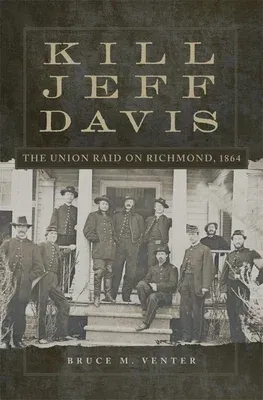The ostensible goal of the controversial Kilpatrick-Dahlgren Raid on
Richmond (February 28-March 3, 1864) was to free some 13,000 Union
prisoners of war held in the Confederate capital. But orders found on
the dead body of the raid's subordinate commander, Colonel Ulric
Dahlgren, point instead to a plot to capture or kill Confederate
president Jefferson Davis and set Richmond ablaze. What really happened,
and how and why, are debated to this day. Kill Jeff Davis offers a
fresh look at the failed raid and mines newly discovered documents and
little-known sources to provide definitive answers.
In this detailed and deeply researched account of the most famous
cavalry raid of the Civil War, author Bruce M. Venter describes an
expedition that was carefully planned but poorly executed. A host of
factors foiled the raid: bad weather, poor logistics, inadequate command
and control, ignorance of the terrain, the failures of supporting
forces, and the leaders' personal and professional shortcomings. Venter
delves into the background and consequences of the debacle, beginning
with the political maneuvering orchestrated by commanding brigadier
general Judson Kilpatrick to persuade President Abraham Lincoln and
Secretary of War Edwin Stanton to approve the raid. Venter's examination
of the relationship between Kilpatrick and Brigadier General George A.
Custer illuminates the reasons why the flamboyant Custer was excluded
from the Richmond raid.
In a lively narrative describing the multiple problems that beset the
raiders, Kill Jeff Davis uncovers new details about the African
American guide whom Dahlgren ordered hanged; the defenders of the
Confederate capital, who were not just the "old men and young boys" of
popular lore; and General Benjamin F. Butler's expedition to capture
Davis, as well as Custer's diversionary raid on Charlottesville.
Venter's thoughtful reinterpretations and well-reasoned observations put
to rest many myths and misperceptions. He tells, at last, the full story
of this hotly contested moment in Civil War history.

